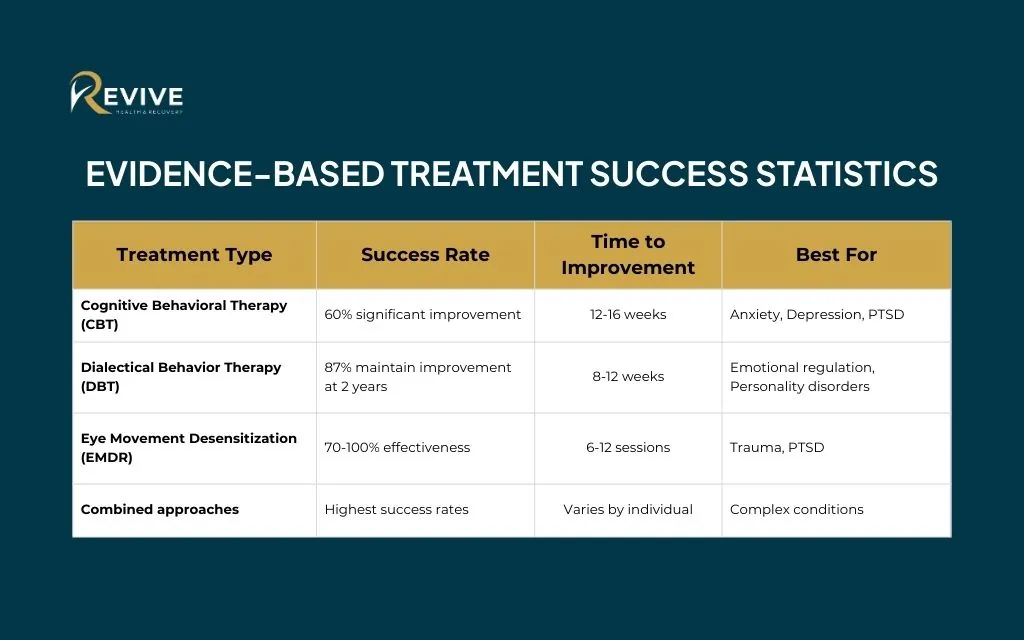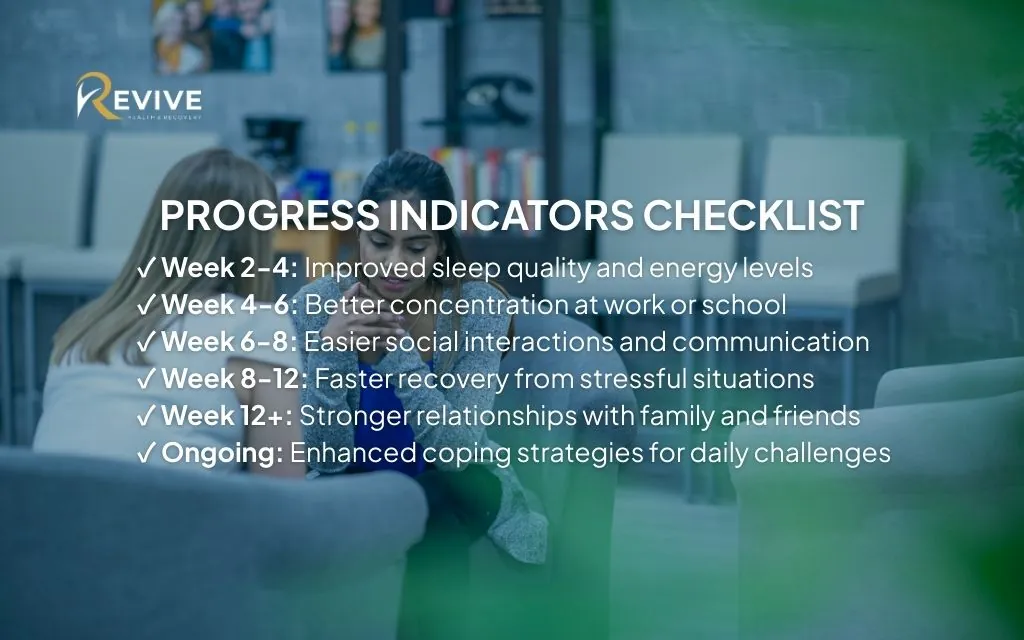How effective is mental health treatment? Mental health treatment effectiveness remains a pressing concern for Colorado residents. With 26.2% of Denver residents reporting poor mental health challenges, understanding treatment success rates becomes essential for making informed decisions about care.
Research consistently shows that evidence-based mental health treatment works. Success rates range from 40-86% depending on the condition and treatment approach you choose. Factors like therapeutic alliance, treatment type, and your level of engagement significantly influence outcomes.
This comprehensive guide examines treatment effectiveness rates and explores what makes therapy successful. We’ll provide Colorado-specific insights to help you navigate your mental health care journey with confidence.
Understanding mental health treatment effectiveness rates
Evidence-based treatment success statistics
When you’re considering mental health treatment, knowing the success rates helps set realistic expectations. Here’s what research reveals about evidence-based therapy success rates Denver providers commonly use:

Combined therapeutic approaches yield the highest success rates. When therapists integrate multiple evidence-based methods, patients experience better outcomes than single-modality treatments.
How treatment effectiveness gets measured
Mental health professionals use standardized tools to track your progress. The PHQ-9 depression scale and GAD-7 anxiety measure provide objective data about symptom changes. These measurement-based care approaches help ensure your treatment stays on track.
Patient satisfaction surveys reveal important insights about treatment quality. Research shows 70-86% satisfaction rates across different therapy types. However, satisfaction alone doesn’t guarantee clinical improvement.
Functional improvement assessments examine how treatment affects your daily life. Can you work more effectively? Do relationships improve? These real-world measures often matter more than symptom scores alone.
Long-term outcome tracking reveals treatment durability. The best therapies produce lasting changes that persist months or years after treatment ends.
Key factors that make mental health treatment effective
The therapeutic alliance foundation
The relationship between you and your therapist creates the foundation for healing. This therapeutic alliance accounts for 30% of treatment success variance across all therapy types.
Trust forms the cornerstone of effective treatment. When you feel safe sharing vulnerable thoughts and feelings, therapy progresses faster. Your therapist’s empathy and genuine care accelerate the healing process.
Collaboration enhances treatment outcomes significantly. The best therapists involve you in treatment planning and goal setting. This partnership approach increases your investment in the recovery process.
Research shows therapeutic alliance predicts success better than specific therapy techniques. A strong connection with your therapist matters more than which evidence-based approach they use.
Evidence-based treatment approaches
Cognitive Behavioral Therapy effectiveness stems from its practical, problem-solving focus. CBT teaches you to identify negative thought patterns and develop healthier coping strategies. This approach works particularly well for anxiety, depression, and trauma recovery.
Dialectical Behavior Therapy combines mindfulness with emotional regulation skills. DBT helps you manage intense emotions without destructive behaviors. The comprehensive skill-building approach creates lasting change.
Eye Movement Desensitization and Reprocessing offers unique trauma healing benefits. EMDR helps your brain process traumatic memories differently, reducing their emotional impact. Many patients experience rapid improvement with this approach.
Trauma-informed care principles enhance all therapeutic approaches. When providers understand how trauma affects the brain and body, they create safer healing environments.
Patient engagement and motivation factors
Treatment adherence significantly impacts your success. Completion rates vary from 31-65% depending on the program structure and individual factors. Higher engagement typically leads to better outcomes.
Goal setting creates direction for your healing journey. When you and your therapist establish clear, achievable objectives, treatment becomes more focused and effective.
Social support systems boost treatment success substantially. Family members and friends who understand your recovery process provide crucial encouragement during challenging moments.
Outpatient vs inpatient treatment effectiveness
Intensive outpatient program effectiveness
Intensive outpatient programs achieve impressive results while allowing you to maintain daily routines. In Colorado, these programs report 86% patient satisfaction rates with outcomes comparable to residential treatment.
IOP vs Inpatient Treatment Comparison:
| Factor | Intensive Outpatient (IOP) | Inpatient Treatment |
| Success Rate | 86% patient satisfaction | 75-80% completion rate |
| Cost | Lower cost option | Higher cost investment |
| Daily Life | Maintain work/family routines | Temporary separation from routine |
| Best For | Mild to moderate symptoms | Severe symptoms, safety concerns |
| Treatment Duration | 3-6 months typically | 30-90 days typically |
IOPs work exceptionally well for appropriate candidates. If you have mild to moderate symptoms, strong motivation, and adequate support systems, outpatient treatment often provides everything you need.
Treatment completion rates tend to be higher in outpatient settings. When therapy integrates with your daily life, you’re more likely to finish the full program and maintain long-term gains.

When outpatient treatment proves most effective
Outpatient therapy effectiveness for anxiety and depression reaches its peak under specific conditions. If your symptoms are manageable and you have stable housing, outpatient care often succeeds brilliantly.
Strong motivation for recovery enhances outpatient success significantly. When you’re committed to change and willing to practice skills between sessions, community-based treatment thrives.
Adequate support systems make outpatient treatment viable. Family members, friends, or support groups provide the encouragement needed during difficult moments.
Safety considerations determine treatment setting appropriateness. If you’re experiencing thoughts of self-harm or severe symptoms, residential care might be necessary initially.
Mental health treatment barriers in Colorado
Access challenges in Denver and Colorado
Colorado Mental Health Challenges:
| Barrier | Impact | Revive’s Solution |
| Provider shortage | Long wait times (2-4 weeks average) | Same-day consultations available |
| Insurance limitations | Limited session coverage | Sliding scale payment options |
| Geographic barriers | Rural area access issues | Telehealth services statewide |
| Stigma factors | Delayed treatment seeking | Confidential, judgment-free environment |
Provider shortages create significant wait times throughout Colorado. Many residents face delays of several weeks before accessing care, which can worsen symptoms during critical periods.
Insurance coverage limitations restrict treatment options for many Coloradans. Prior authorization requirements and limited session benefits create barriers to comprehensive care.
Geographic barriers affect rural Colorado residents disproportionately. Limited transportation options and provider scarcity make consistent treatment attendance challenging.
Overcoming treatment barriers
Telehealth services expand access dramatically across Colorado. Video therapy sessions eliminate transportation barriers and increase scheduling flexibility for busy individuals.
Sliding scale payment programs make treatment affordable for uninsured residents. Many Colorado providers offer reduced fees based on income, ensuring financial constraints don’t prevent healing.
Community mental health resources provide safety nets for underserved populations. Nonprofit organizations throughout Colorado offer support groups and crisis intervention services.
Peer support programs connect you with others who understand your struggles. These programs provide hope and practical guidance from people who’ve successfully navigated recovery.
Measuring your treatment progress
Measurement-based care approaches
Only 20% of mental health providers consistently use standardized outcome measures to track progress. This represents a significant gap in treatment quality assurance.
Regular symptom monitoring using validated tools helps identify what’s working. Your therapist should use questionnaires like the PHQ-9 or GAD-7 to track changes objectively.
Treatment goal tracking ensures therapy stays focused on your priorities. Regular check-ins about progress toward specific objectives keep treatment relevant and effective.
Patient feedback integration improves treatment outcomes significantly. When therapists regularly ask about your experience and adjust approaches accordingly, success rates increase.
Signs of effective treatment

Symptom reduction typically begins within 4-6 weeks of consistent therapy. You might notice improved sleep, reduced anxiety, or increased energy as early indicators of progress.
Enhanced daily functioning shows treatment is working. Can you concentrate better at work? Do social interactions feel easier? These improvements indicate meaningful change.
Better coping strategies develop gradually through effective treatment. You’ll find yourself handling stress more skillfully and recovering faster from setbacks.
Improved relationship quality often follows successful therapy. As you develop healthier communication patterns and emotional regulation skills, connections with others deepen.
Colorado-specific mental health resources and outcomes
Colorado mental health landscape by Numbers:
- 26.2% of Denver residents report poor mental health
- Colorado ranks 46th nationally in mental health outcomes
- 86% satisfaction rate with IOP programs statewide
- 20-30% treatment dropout rate (industry average)
- 31-65% treatment completion rates vary by program type
Denver-specific mental health statistics reveal significant needs within our community. Local data shows higher rates of anxiety and depression compared to national averages.
Community resources throughout Colorado provide valuable support networks. From crisis hotlines to support groups, these services complement professional treatment effectively.
Trauma-informed care implementation has expanded statewide. More Colorado providers now understand how trauma affects healing and adjust their approaches accordingly.
Finding effective treatment in Colorado
When choosing providers, look for evidence-based practice credentials. Therapists trained in CBT, DBT, or EMDR typically achieve better outcomes than those using unproven methods.
Ask potential therapists about their measurement-based care practices. Providers who track progress systematically demonstrate commitment to treatment effectiveness.
Insurance considerations affect treatment access significantly. Verify coverage details and understand your benefits before beginning therapy to avoid unexpected costs.
Evidence-based practices should be non-negotiable in your provider selection. Research-supported treatments consistently outperform alternative approaches across all conditions.
FAQs about how effective is mental health treatment
How long does it take for mental health treatment to be effective?
Most people notice improvements within 4-6 weeks of consistent treatment. Significant changes typically occur within 12-16 weeks. Treatment duration varies based on condition severity and individual factors. At Revive Health Recovery, we use measurement-based care to track your progress and ensure you’re seeing results.
Is therapy more effective than medication for mental health conditions?
Research shows therapy and medication demonstrate comparable effectiveness for many conditions. Combined treatments often yield the best results. CBT can be as effective as medication for depression and anxiety, with longer-lasting benefits. Revive Health Recovery specializes in evidence-based therapies that create lasting change.
What makes some people more successful in mental health treatment than others?
Strong therapeutic alliance, treatment engagement, and social support systems predict success. Motivation for change and practicing skills between sessions also matter significantly. At Revive Health Recovery, we focus on building these success factors into every treatment plan.
How can I tell if my mental health treatment is working effectively?
Look for gradual symptom reduction, improved daily functioning, and better coping strategies. Your therapist should use standardized measures to track progress objectively. Revive Health Recovery implements systematic progress monitoring to ensure your treatment stays effective.
Are intensive outpatient programs as effective as inpatient treatment?
For appropriate candidates, IOPs demonstrate effectiveness comparable to residential treatment. They work best for individuals with mild to moderate symptoms and strong support systems. Revive Health Recovery’s intensive outpatient program achieves excellent outcomes while allowing you to maintain your daily routine.
Why choose Revive Health Recovery for effective mental health treatment
1. Evidence-based treatment approaches
Revive Health Recovery utilizes proven therapies including CBT, DBT, and trauma-informed care. Our evidence-based methods achieve documented effectiveness rates of 60-87% for various mental health conditions.
2. Personalized intensive outpatient programs
Our IOP services provide intensive support while maintaining your daily routine. We achieve 86% patient satisfaction rates with outcomes comparable to residential treatment for appropriate candidates.
3. Measurement-based care focus
We implement systematic progress tracking using standardized assessment tools. This ensures your treatment remains effective and gets adjusted based on your individual response and goals.
4. Experienced, compassionate team
Our licensed professionals prioritize building strong therapeutic alliances. This factor accounts for up to 30% of treatment success and creates a safe, supportive environment for healing.
5. Colorado community connection
As a Denver-based center, we understand the unique mental health challenges facing Colorado residents. We provide culturally relevant, community-integrated care that addresses local barriers to treatment access.
Conclusion
Mental health treatment effectiveness depends on evidence-based approaches, strong therapeutic relationships, and personalized care that meets your unique needs. Research consistently shows these treatments work when delivered by qualified professionals.
At Revive Health Recovery, we combine proven therapeutic methods with compassionate care. Our team understands the challenges you face and provides the support needed for lasting recovery.
Your mental health matters, and effective treatment is available. Don’t let another day pass wondering if things can improve. They can, and we’re here to help make that happen.
Ready to experience effective mental health treatment? Contact Revive Health Recovery today.
📍 Address: 1427 S Federal Blvd, Denver, CO 80219
📧 Email: contact@revivehealthrecovery.com
📞 Call Us – Available 24/7: (303) 268-4655
Take the first step toward recovery. Our compassionate team is ready to support your healing journey with evidence-based, effective mental health treatment tailored to your specific needs.



